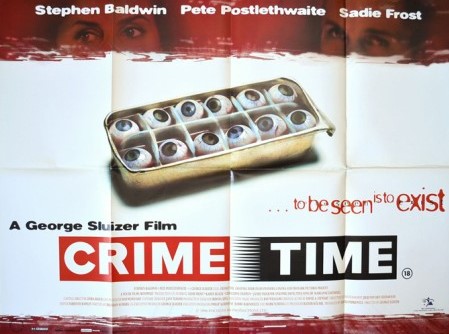 A strikingly weird British made entry in the media satire craze of the 1990s, though not a very successful one!
A strikingly weird British made entry in the media satire craze of the 1990s, though not a very successful one!
Other nineties era media satires, which took television to task for its exploitive nature (from which movies are apparently immune) and foreshadowed the rise of reality TV in the US, include MAN BITES DOG, SERIAL MOM, NATURAL BORN KILLERS, S.F.W. and THE TRUMAN SHOW. By the time CRIMETIME arrived in 1996 the subject was old hat, and the film went straight to video in the U.S.
CRIMETIME was a crucial component in the decline of the late George Sluizer (1932-2014), who hit it big with the excellent SPOORLOOS (THE VANISHING) in 1988. Yet Sluizer never quite recovered from his lousy 1993 Hollywood remake of that film, or the aborted production of DARK BLOOD (curtailed by the death of its star River Phoenix). CRIMETIME, starring Stephen Baldwin and the late Pete Postlethwaite, followed, and did its director and cast no favors.
Sometime in the future, Bobby, an intense young actor, is cast as a serial killer in a popular TV program called CRIMETIME. Each week this show presents a grisly recreation of an actual crime in an apparent effort at getting witnesses to call in—in actuality, though, the show is run by amoral sleazeballs interested only in ratings.
Shortly after filming his CRIMETIME segment Bobby receives a strange answering machine message inquiring “Why didn’t she cry?,” followed a few days later by another equally cryptic message: “Remember how soft they are.” Bobby is convinced the messages are from the killer he’s portraying—which indeed they are.
Said killer is a middle-aged freak who collects the eyeballs of his victims so he can fondle them while lamenting that “no one sees me!” After getting beaten up by his latest victim the killer decides to hang up his hat, calling Bobby and asking him to continue the killing spree. The mentally deteriorating Bobby declines the offer but realizes he’ll be out of a job if there are no more killings. His following actions are reckless and disturbing, and explicable only to the killer. When the latter phones Bobby requesting a face-to-face meeting, Bobby is only too eager to oblige.
This film has many strong elements—a chilling performance by the always-formidible Pete Postlethwaite as the killer, a sophisticated intermingling of different tones that keeps the viewer constantly on edge—which makes it all the more frustrating that it doesn’t work overall.
Chief among CRIMETIME’S problems is the lead performance of Stephen Baldwin, which appears to have been intended to invoke the type of dangerous charisma exuded by Malcolm McDowell in A CLOCKWORK ORANGE and Stephen’s brother Alec in MIAMI BLUES. It doesn’t work, as the character comes off as merely weird and off-putting.
The film is also vastly overlong (running a full two hours) and burdened with a ham-fisted take on televised violence that’s never as cutting or profound as Sluizer and his collaborators seem to think it is.
Vital Statistics
CRIMETIME
Arts Council of England/Focus Films
Director: George Sluizer
Producer: David Pupkewitz
Screenplay: Brendan Somers
Cinematography: Jules van den Steenhoven
Editing: Fabienne Rawley
Cast: Stephen Baldwin, Pete Postlethwaite, Sadie Frost, Karen Black, Geraldine Chaplin, James Faulkner, Philip Davis, Marianne Faithfull, Emma Roberts, Anne Lambton
